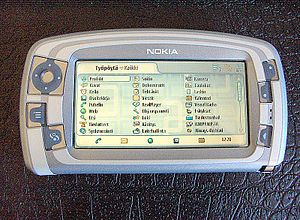Nokia 7710
 | |
| Manufacturer | Nokia |
|---|---|
| Availability by region | 2004 |
| Predecessor | Nokia 7700 |
| Successor | Nokia 770 Internet Tablet Nokia N800 |
| Compatible networks | GPRS, HSCSD, EDGE |
| Dimensions | 128 x 69.5 x 19 mm |
| Weight | 189 grams |
| Operating system | Symbian OS / Nokia Series 90 |
| Memory | ~90MB (shared) |
| Removable storage | MMC |
| Battery | Lithium-polymer, 1300 mAh |
| Rear camera | 1 MP, Video Recording |
| Display | 640 x 320 px, 65,536 colours |
| Connectivity | Bluetooth, Nokia Pop-Port (USB) |
| Data inputs | Touchscreen |
The Nokia 7710 is a smartphone developed by Nokia and announced on 2 November 2004.[1] It was the first Nokia device with a touchscreen, and first device with 2:1 aspect ratio display.[2][3] The 7710 is based on the Nokia 7700 which was never released. It is Nokia's only smartphone to run the Series 90 interface atop Symbian OS v7.0s.
Features
Compatible with GSM/HSCSD/GPRS/EDGE 900/1800/1900 MHz networks, the 7710 features a wide, touch-screen colour LCD with a resolution of 640 x 320 pixels and 16-bit colour depth, which also boasts a special power save mode activating only 640 x 64 pixels of the display. It has 90 MB of internal memory supported by a 128 MB MultiMedia Card (MMC). The external memory can be upgraded up to 2 GB.
Moreover, the Nokia 7710 also offers multiple-format video recording courtesy of its integrated digital camera, supporting QCIF resolution at 17 frame/s in MPEG4, H.263 and Real Video 8 formats - for which the device also supports full-screen playback at 15 frame/s. Additionally, a music player supports MP3, AAC, RealAudio 7 and 8, WAV, MIDI and AMR formats, whilst picture viewing is also in place with support for JPEG, GIF, WBMP, BMP, MBM and PNG formats.
Due to pilot projects in some select areas there also exists 7710 phones which contain an optional DVB-H tuner module.[4][5] DVB-H wouldn't be complete for the consumer market until the Nokia N92 exactly a year after the 7710.
Considering the particularity of this model (big screen, without keys, touch screen), the Italian subsidiary of Nokia decided to arrange creative brainstorming to find a use for this phone "completely new". It was sold along with a satellite receiver and has been used as the first satellite navigation system on mobile phones in the world.
Specifications
| Dimensions | 128 x 69.5 x 19 mm, 142 cc |
| Weight | 189 g |
| Display | 3,5 inch TFT touchscreen, 65,536 colors, 640 x 320 pixels |
| GPRS | Class 10 (4+1/3+2 slots), 32–48 kbit/s |
| HSCSD | 43.2 kbit/s |
| EDGE | Class 10, 236.8 kbit/s |
| Bluetooth | v1.2 |
| USB | Yes, Pop-Port |
| Messaging | SMS, MMS, Email |
| Camera | 1.3-0.99 megapixels depending on firmware (1280 x 1024 px - 1152 x 864 px), video (QCIF), (with update to firmware version 4.10, 1.3 megapixels) |
| CPU | ARM 168 MHz (source: Gsmarena) |
| Storage | MMC memory card (128Mb–2Gb) + 90Mb internal memory |
| Operating System | Symbian OS v7.0s, Series 90 UI |
| Other Software | complete PIM suite - office applications (word processor, spreadsheet and PowerPoint viewer), - E-mail client (SMTP, POP3, IMAP4) video and audio player, Java MIDP 2.0 apps |
| Browser | WAP/xHTML, HTML with Flash 6 support |
| Battery | lasts approx. 240–342 hours |
References
- ^ "Experience mobile multimedia with the widescreen Nokia 7710 - Nokia". Nokia. Retrieved 13 April 2018.
- ^ Tomi Savolainen (14 August 2012). "Näppäimistö voitti kosketusnäytön". Tekniikka & Talous (in Finnish).[permanent dead link]
- ^ http://www.gsmarena.com/nokia_7710-921.php Nokia 7710 specs
- ^ "Nokia 7710 Smartphone gets Mobile TV with DVB-H".
- ^ "Nokia 7710 review: Is this the right track?".
